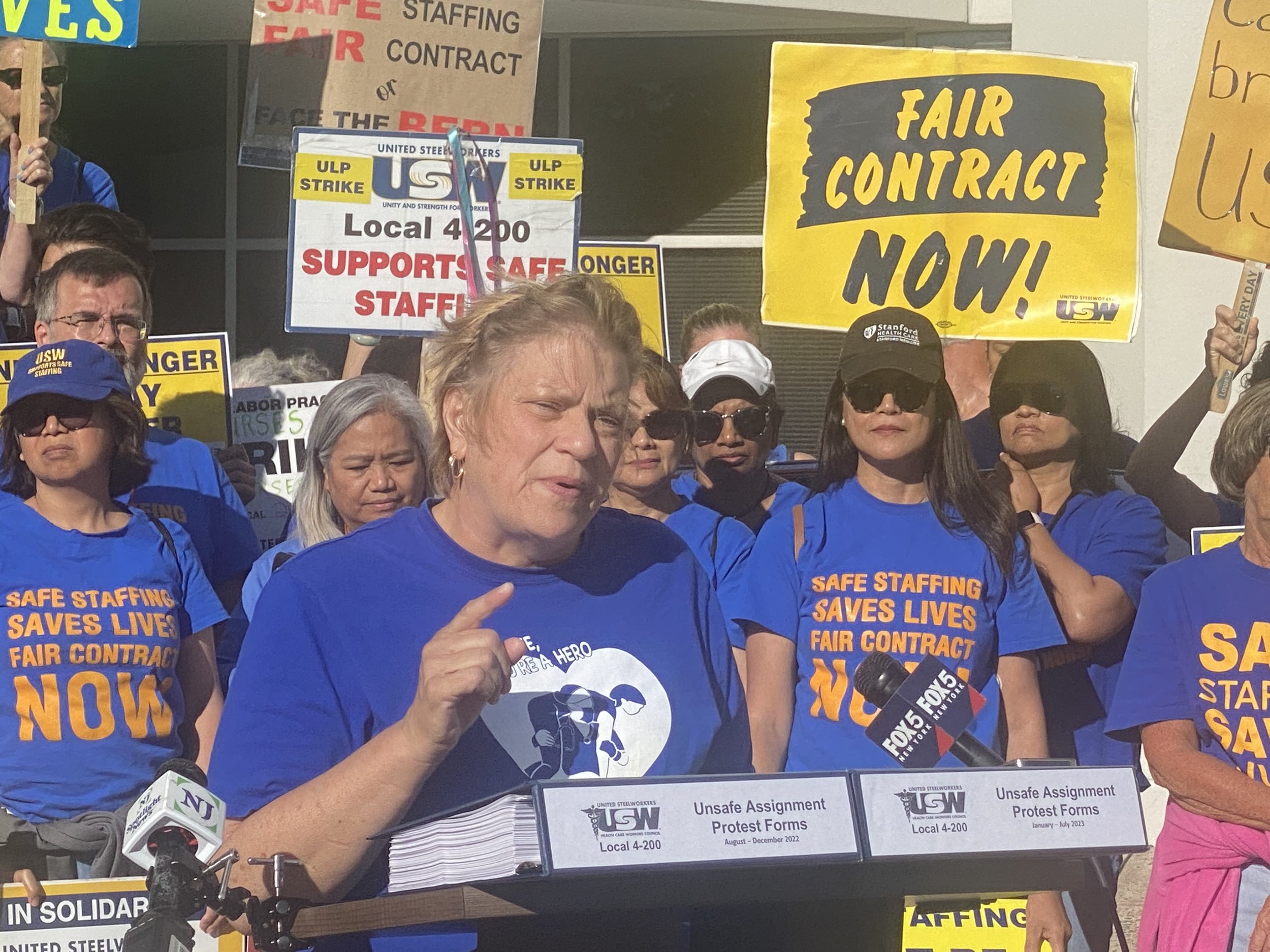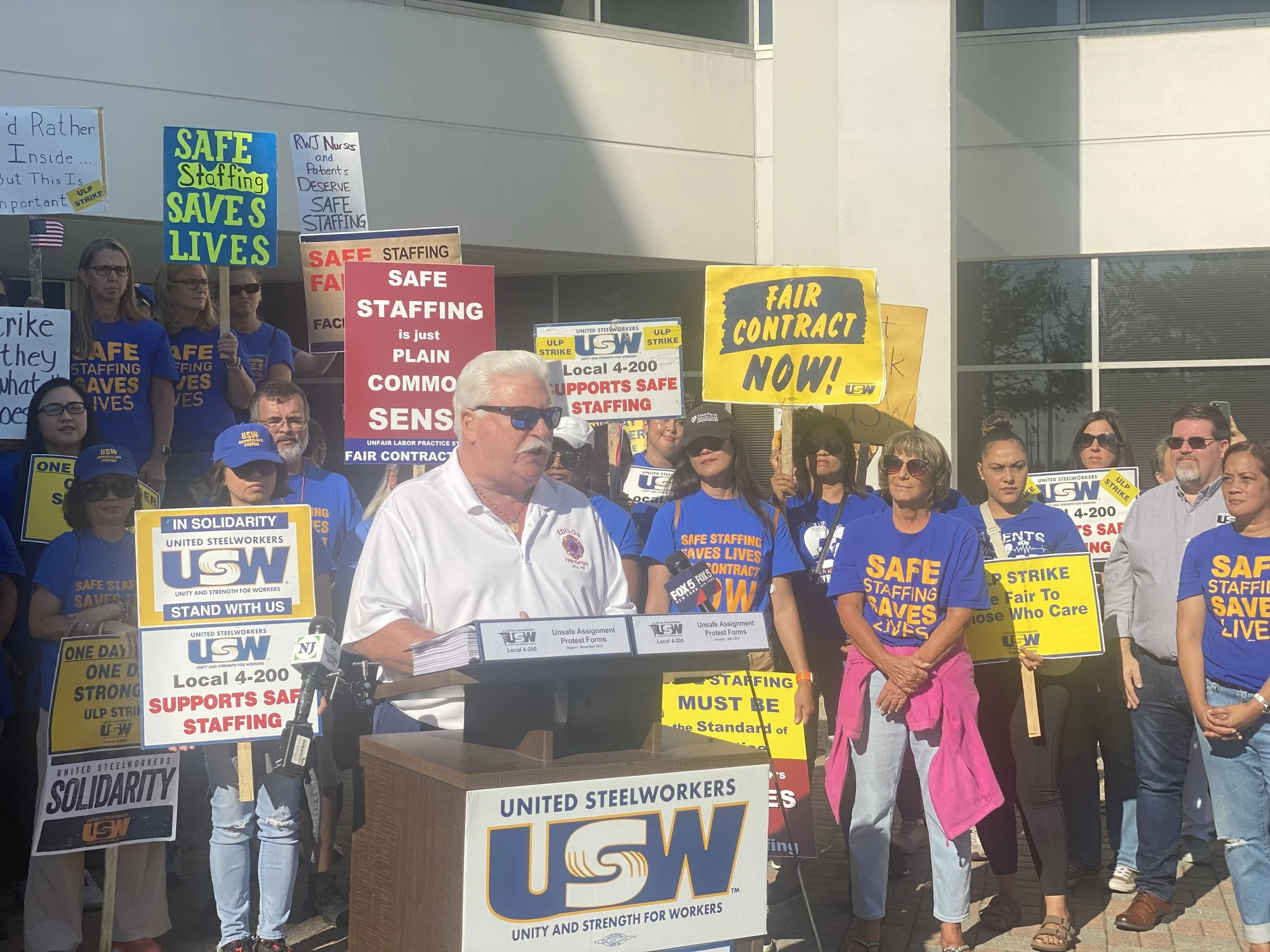‘CEOs Care About One Thing Only - Profit’
Judy Danella, president of USW Local 4-200.
Disturbing Video of striker being violently pushed on the picket line follows story…
By Bob Hennelly
A month-and-a-half into the United Steelworkers Nurses Local 4-200 strike for safer staffing at the Robert Wood Johnson University Hospital in New Brunswick, New Jersey and a settlement continues to be elusive as the rhetoric is heating up on both sides.
Gov. Phil Murphy, prompted this week by a caller into his public radio show “Ask the Governor”, said RJW Barnabas should reach a deal with the striking nurses.
“I’m not happy. We are a proud, pro-labor state,” Murphy said. “There’s no group of workers that are more heroic than our frontline healthcare workers and the fact that this going on without any resolution is, in my opinion, unacceptable.”
The close to 1,700-member bargaining unit has been out since Aug. 4. Earlier this month, the hospital, which is self-insured, terminated the nurses’ health insurance.
Judy Danella, president of USW Local 4-200, told Work-Bites that a Sept. 14 negotiation session, the second one convened by the federal mediator assigned to the dispute, produced no progress.
Before the bargaining session at an office building in Iselin, well over one hundred nurses and their supporters from the community and other unions held a spirited rally as motorists honked their horns in support. That same morning, management sent out a “Point by Point Response to Recent Steel Worker Union Leadership Statements” which accused the union of not keeping members informed on multiple issues including how “the hospital pleaded with them to delay the strike so we could continue to negotiate.”
“Basically, they told us in no uncertain terms the union is lying,” Danella told the boisterous crowd. “What they said to you is that everything the union has told you is a lie. I am here to tell you I have never been a liar, nor do I intend to start being a liar. I was not placed in this position; I was elected by the members to this position. I have never lied to them, nor will I ever lie to them.”
Robert Yackel, president of the Edison Firefighters union, told the crowd his members know all too well the nature of the nurses’ struggle for safer staffing.
“Our firefighters interact with these nurses many, many times over the years — they have the same issue we understand,” Yackel said. “It’s critically important to have the safe staffing because if you don’t have the safe staffing — whether it’s firefighters or nurses — people’s lives are hanging in the balance. That’s the point not to be diminished. Everybody should be behind these nurses. They are fighting for you.”
Robert Yackel, president of the Edison Firefighters union.
Yackel continued, “Nobody wants to address this [staffing] on the management side because it cuts into their bottom line. We are not interested in the bottom line. We are interested in keeping alive.”
SEIU 1199’s Andy Cassagol represents the nurses at Clara Maass Medical Center in Belleville, another RWJBarnabas hospital. The nurses voted to unionize in August of 2021, and have yet to have their first contract. Cassagol told the crowd his members face the same challenges with staff shortages across job titles.
“Staffing is a problem that is not new in New Jersey or the nation,” Cassagol said. “At Clara Maass our nurses face the same struggles. We cannot take care of our patients because we are too busy doing the work of all the other staff.”
“[RWJBarnabas] CEO Mark Manigan cares nothing for these nurses,” the CWA’s James McAsey told the crowd. “CEO Mark Manigan cares nothing for these patients that you serve. CEO Mark Manigan cares nothing for this entire community. CEOs care about one thing only — profits. These corporations — these healthcare conglomerates are some of the worst corporate actors out there. They are corporate greed personified.”
On Sept. 9, a large crowd of striking nurses and their supporters marched on Manigan’s home in Maplewood and held a vigil.
The RWJBarnabas system is a not-for-profit healthcare giant with a dozen acute care hospitals and a partnership with Rutgers University. The system has 38,000 employees and $6.6 billion in revenue. It relies on hundreds of millions of dollars in tax-exempt state issued bonds for capital construction.
The system’s recently-retired CEO and President Barry Ostrowsky earned $16 million in the second year of the pandemic, making him the highest paid hospital executive in the New York area, according to Crain’s New York .
The renewed push for the staffing requirements comes as a national survey predicted New Jersey would be shy 11,400 nurses by 2030, ranking it in the top-ten states with a severe shortfall. Also into that crisis, mix Connecticut (27,926), New York (18,784), and Pennsylvania (16,430).
Months before the Robert Wood Johnson University Hospital nurses strike, the state’s nurses’ unions rallied in Trenton to renew their push for Trenton to enact binding safe staffing standards statewide. That legislation is pending.
Debbie White, an RN and president of Health Professionals and Allied Employees, New Jersey’s largest healthcare union, cited peer reviewed research that tracked the positive results of California’s adoption of nurse-to-patient staffing ratio standard almost twenty years ago.
“They found that for patients a decreased likelihood of patient death; decreased admittance to critical care; improved patient outcomes; improved patient satisfaction; less hospital acquired infections; decreased patient readmissions — and one of my personal favorites — less workplace violence,” White said. “Healthcare workers are five times more likely to be assaulted than any other profession. If healthcare workers are safe, patients are safe.”
White continued, “Safe staffing not only makes patients and healthcare workers safer, but it also causes better retention of staff. Less turnover, which mean less orientation costs, because you know there’s a revolving door — they come in, they leave. Better outcomes lead to better CMS [Centers for Medicare & Medicaid Services] reimbursement, less lawsuits. Safe staffing saves money.”
According to HPAE, a third of New Jersey’s nurses working directly with patients in the hospital setting have left the profession in the last three years. In that same survey of its members, the union found that close to three quarters of hospital nurses polled had considered leaving in recent years with newer hires more likely to exit. Short staffing, burnout and job-related stress were the most common complaints.
“Our nurses are the backbone of our healthcare system. But current staffing levels are threatening our healthcare system’s ability to provide the level of care we need, and it is taking its toll on already strained healthcare workers,” declared New Jersey State AFL-CIO Secretary-Treasurer Laurel Brennan. “Unfortunately, some hospitals are opposed to improving staffing ratios because they are choosing to prioritize profits, even as we reach a post-pandemic healthcare staffing crisis point.”
In the video below, Tamara Lefcowitz, USW national representative, is seen being violently pushed by security while picketing outside Robert Wood Johnson University Hospital on Sept. 14.


